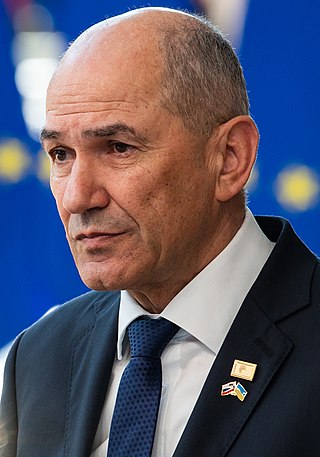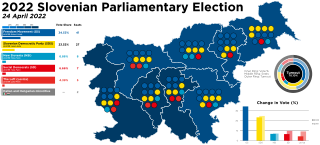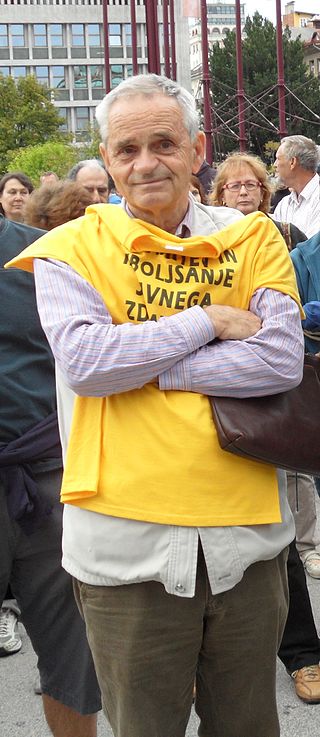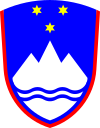
The Slovenian Democratic Party, formerly the Social Democratic Party of Slovenia, is a conservative parliamentary party; it is also one of the largest parties in Slovenia, with approximately 30,000 reported members in 2013.

The Democratic Party of Pensioners of Slovenia is a political party in Slovenia led by Ljubo Jasnič. The party claims broadly liberal values with a strong focus on the interests of the retired and the elderly. Despite being part of virtually every governmental coalition of Slovenia since it started appearing on voting ballots, the party only secured 0.66% of all votes at the most recent Slovenian parliamentary election in 2022 and thus failed to secure any seats in the National Assembly.

Ivan Janša, baptized and best known as Janez Janša, is a Slovenian politician who served three times as a prime minister of Slovenia, a position he had held from 2004 to 2008, from 2012 to 2013, and from 2020 to 2022. Since 1993, Janša has led the Slovenian Democratic Party, which has emerged as the pre-eminent Slovenian conservative party. Janša lost his fourth bid for prime minister in April 2022, his party defeated by the Freedom Movement party.
Same-sex marriage has been legal in Slovenia since 9 July 2022 in accordance with a ruling from the Constitutional Court of Slovenia. The court ruled that the ban on same-sex marriages violated the Constitution of Slovenia and gave the Parliament six months to amend the law to align with the ruling, although the decision took effect immediately after publication. The National Assembly passed legislation to align with the court ruling on 4 October 2022, which was vetoed by the National Council one week later, but the veto was then overridden by the National Assembly on 18 October 2022.

Lesbian, gay, bisexual, and transgender (LGBT) rights in Slovenia have significantly evolved over time, and are considered among the most advanced of the former communist countries. Slovenia was the first post-communist country to have legalised same-sex marriage, and anti-discrimination laws regarding sexual orientation and gender identity have existed nationwide since 2016.

Presidential elections were held in Slovenia in October and November 2007 to elect the successor to the second President of Slovenia Janez Drnovšek. France Cukjati, the President of the National Assembly, called the elections on 20 June 2007.
Mladina is a Slovenian weekly left-wing political and current affairs magazine. Since the 1920s, when it was first published, it has become a voice of protest against those in power. Today, Mladina's weekly issues are distributed throughout the country. Mladina is considered one of the most influential political magazines in Slovenia.

Gregor Virant is a Slovenian politician and public servant. Between 2004 and 2008, he served as Minister of Public Administration in Janez Janša's first government, between 2011–2013 he was Speaker of the National Assembly of Slovenia. He also served as Minister of the Interior and Public Administration in the government of Alenka Bratušek between 2013 and 2014.

Parliamentary elections were held in Slovenia on 4 December 2011 to elect the 90 deputies of the National Assembly. This was the first early election in Slovenia's history. The election was surprisingly won by the center-left Positive Slovenia party, led by Zoran Janković. However, he failed to be elected as the new Prime Minister in the National Assembly, and the new government was instead formed by a right-leaning coalition of five parties, led by Janez Janša, the president of the second-placed Slovenian Democratic Party. The voter turnout was 65.60%.
Presidential elections were held in Slovenia on 11 November 2012, with a run-off held on 2 December. Slovenia's 1.7 million registered voters chose between the incumbent president Danilo Türk, the SDS/NSi party candidate Milan Zver and Borut Pahor of the Social Democrats who was also supported by the Civic List. The first round was won, contrary to the opinion poll predictions, by Pahor, with Türk placing second. In the run-off election, Pahor won with roughly two-thirds of the vote.

Parliamentary elections were held in Slovenia on 13 July 2014 to elect the 90 deputies of the National Assembly. The early election, less than three years after the previous one, was called following the resignation of Alenka Bratušek's government in May. Seventeen parties participated, including seven new parties, some of which formed only months before the election took place. Party of Miro Cerar (SMC), a new party led by lawyer and professor Miro Cerar, won the election with over 34% of the vote and 36 seats. Seven political parties won seats in the National Assembly. Three political parties left the Assembly, including Zoran Janković's Positive Slovenia, the winner of the 2011 election. A leftist United Left party entered the Assembly for the first time, winning six seats.

A referendum on a bill legalising same-sex marriage was held in Slovenia on 20 December 2015. The bill was rejected, as a majority of voters voted against and the votes against were more than 20% of registered voters.

Presidential elections were held in Slovenia on 22 October 2017. Nine candidates ran in the first round of the elections, in which the incumbent independent President Borut Pahor placed first and Marjan Šarec of the List of Marjan Šarec (LMŠ) placed second. No candidate received a majority of the vote in the first round, resulting in a run-off between Pahor and that was held on 12 November 2017. Pahor won the run-off with 53% of the vote; voter turnout in the second round was 42.13%, the lowest in any presidential election since independence.
A referendum on a law governing the Divača-Koper rail upgrade was held in Slovenia on 24 September 2017. The referendum was marked by a low turnout; a majority of voters voted in favour of the proposed law. The results were annulled by the Supreme Court in March 2018, resulting in a new referendum being held in 13 May 2018.

Parliamentary elections were held in Slovenia on 24 April 2022 to elect all 90 members of the National Assembly.

Vili Kovačič is a Slovenian impact litigation activist and blogger, who was the first in Europe to successfully challenge a referendum result based on a campaign finance violation. His challenge resulted in the resignation of Prime Minister Miro Cerar and early parliamentary elections in 2018. His successful challenges to elections and referendums resulted in Constitutional Court reforming Slovenian electoral laws and practices.
The 14th Government of Slovenia was formed following the resignation of Prime Minister of the 13th Government Marjan Šarec in January 2020. Janez Janša of Slovenian Democratic Party formed a coalition with Modern Centre Party, New Slovenia, and Democratic Party of Pensioners of Slovenia. The government was confirmed on 13 March 2020, amidst the COVID-19 pandemic.
A referendum on amendments to the Waters Act was held in Slovenia on 11 July 2021. According to the environmental activists and the domain experts, the provisions of the law would have detrimental effects on the environment and on clean water. With one of the highest turnouts in recent history, the Act was overwhelmingly rejected by the voters.
In the run-up to the next Slovenian parliamentary election, various organisations carry out opinion polling to gauge voting intention in Slovenia. Results of such polls are displayed in this article.
A three-part referendum was held in Slovenia on 27 November 2022. Voters were asked whether they approve of proposals to repeal three laws; one on the cabinet of government ministers, one delaying a bill regarding long-term care for pensioners, and one on reorganising the governing bodies of state-owned broadcaster RTV Slovenija. Voters voted in favour of retaining all three laws.












